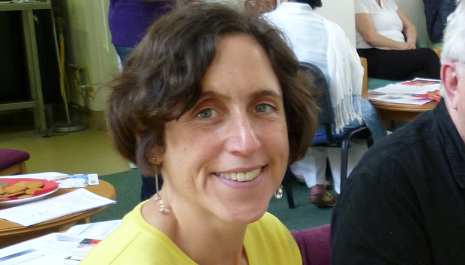Why do so many people Google search this term? What's going on? Our MD Emma Solomon investigates...
The Brief
 We noticed that 3600 people per month search for the term 'Facebook for older people' in Google. This really piqued our interest – why, what are they looking for, what ‘is’ Facebook for older people?! We bundled our questions into a rather short Brief and gave it to Emma: tell us something about ‘Facebook for older people’! This is what she came back with.
We noticed that 3600 people per month search for the term 'Facebook for older people' in Google. This really piqued our interest – why, what are they looking for, what ‘is’ Facebook for older people?! We bundled our questions into a rather short Brief and gave it to Emma: tell us something about ‘Facebook for older people’! This is what she came back with.
Mission impossible
 It has taken me a few weeks of pottering and snooping about online and on Facebook to conclude that my brief was a red herring, a wild goose chase.
It has taken me a few weeks of pottering and snooping about online and on Facebook to conclude that my brief was a red herring, a wild goose chase.
There is in fact nothing more pertinent to write under the heading ‘Facebook for older people’ than there is under the title ‘Facebook for beginners’ or ‘Facebook for the undecided’ and for this, rejoice: Facebook is not ageist.
Facebook is, for the most part, age agnostic. It does not care whether you are 19 or 90. Facebook is a social network and the only thing it cares about is whether you are too, and whether it can tempt you to run your social network online, and grow it and decorate it, with add ons and glitter and other frippery like an online magpie.
Can you let it all hang out?

For the undecided and the uninitiated, understanding how an online social network works is the first step towards understanding whether you want to join one.
Online social networks aggregate and share relationships and connections and they generate new relationships, create more connections and they do this in a wholly public way. This can be a wonderful, intriguing, sociable experience and it can also become a nerve wracking, self-conscious and divisive one. Once you have chosen to connect with Friends on Facebook, while you can decide what you share with them, share you will. Some of the more thought provoking accounts – tirades and coruscations – I mulled while researching this piece were related to the conflict and regret that older and younger family members had sharing – or ‘finding out about’, ‘snooping on’ – each other via Facebook. And for every one of those stories, there is one to find which illustrates the pleasure a relative or friend at a distance and with a busy life has gleaned from peeking into online scrapbook – cum-diary of another relative or friend they’ve been unable to maintain regular contact with in person, by letter, phone of even email.
Age is irrelevant, be who you are

Facebook for older people is quite simply what they want it to be. My octogenarian father joined Facebook to prove he could, but he has no real interest in it or use for it. His primary relationships are conducted, technology wise, by Skype or email, that’s what suits the person he is. Someone else’s father will be different, and that’s quite simply a reflection of the natural diversity in communication methods and preferences, one is not more right or better than another.
For older people, and those supporting or interested in older people, evaluating the usefulness of otherwise of Facebook, my recommendation is simple. Think about the person, their needs and desires, the way they lead their lives and how their relationships work, and then decide whether the medium is appropriate.
If you are older, or of you are younger, and if you are not on Facebook and wonder whether you should be, the first question you should ask yourself is, are the people I want to be in touch with on Facebook. This might be both the people you are already in contact with and the people you want to be in contact with. If you have children and grandchildren and other family members and friends who use Facebook as a matter of course in maintaining and extending their relationships, then you might want to join them there too.
 And should this be the case, then the next consideration is, do you have the time and inclination - and that means, are you comfortable with the idea of socialising in public and not privately – to get any benefit from having and maintaining a social network on Facebook? Facebook is a push-pull experience, the more you put into it, the more you will get out of it. This is definitely something my father can’t reconcile. He is no more inclined to post regular updates about his hobbies, outings, cooking or general life wisdom on Facebook, for wider consumption, than he is to accompany Ranulph Fiennes across Antarctica. But a few of his peers thrive there, doing just that.
And should this be the case, then the next consideration is, do you have the time and inclination - and that means, are you comfortable with the idea of socialising in public and not privately – to get any benefit from having and maintaining a social network on Facebook? Facebook is a push-pull experience, the more you put into it, the more you will get out of it. This is definitely something my father can’t reconcile. He is no more inclined to post regular updates about his hobbies, outings, cooking or general life wisdom on Facebook, for wider consumption, than he is to accompany Ranulph Fiennes across Antarctica. But a few of his peers thrive there, doing just that.
The convening power of social networks
The other thing Facebook is very popular for, across the ages, is convening and organising. Facebook groups for mums who want and offer babysitting favours to other mums for ‘credits’; pages for campaigns to solicit support and broadcast news from; groups for self-organising communities of interest to manage themselves through and thrive in. And again, it matters not what your age is, it matters only that you have a vested interest, or want to declare a passion, or want to stay updated and convened around an issue with others of similar intent, outlook or interest.
When sharing isn’t always good for you
It did strike me that Facebook is perhaps more of a fair weather friend and while everyone is a friend it can be a happy bubbly place with larks a plenty and hilarious photos to share.
You can use Facebook to rekindle friendships, find people you have lost touch with and certainly there is lots to be positive about in this. However, what do you do with ex-partners or once-upon-a-time friends; what do you do with your children’s friends or partners (or indeed children) when you find out a bit too much about them, what happens when relationships have fallen by the wayside or become difficult in real life and you have to manage that disintegration again online? On Facebook you have the public humiliation – or liberation – of being ditched or dumped, or choosing to ditch or dump. Online, emotions can get magnified, distorted and misunderstood in a way and at a speed that just doesn’t happen offline.
If you do go, take maps
We’ve written a number of starter Guides to using Facebook which you can find here. From getting started to uploading photos to using Facebook safely. As any good Scout Leader would say, be prepared. You can also join in the discussions here and also here, on Facebook itself. Marvel at the completed circle.
 And, finally, the evidence
And, finally, the evidence
At Digital Unite, we are always very interested in evidence. How do people use things and what do they do when they do?
When we did our survey in 2011 of people aged over 55 years who had been using the internet for 5 years or less), 40% actively used social networking sites and 60% didn’t.
Of those 40% who did, 47% used Facebook, 7% used Twitter and 50% used ‘Other’ which is phenomenally interesting. ‘Other’ was an optional free text field, and examples include a number of topic specific and proprietary (as in for example, Sagazone) social networks. ‘Other’ may also cover dating and partner-finding sites, and fly fishing and battle re-enactment networks, so let’s not get carried away. In the 2013 survey we will be very sure to ask more focussed questions around this substantial but enigmatic ‘other’ category.
Men over 55 are less likely to use social networking sites than women (34% compared to 42% of women) , and women are also more likely to use Facebook (as opposed to another social networking platform) but only slightly (49% to 43%).
When we look at age breakdown it seems the use of social networking and similarly Facebook decreases the older we get but there is a bit jump when we reach 76+ (the sample size gets smaller the older we are so we need to treat this with caution)
- 55 to 60 – 46% (FB 53%)
- 61 to 65 – 38% (FB 46%)
- 66 to 70 - 28% (FB 41%)
- 71 to 75 – 9% (FB 18%)
- 76+ - 32% (32%)
Happy Facebooking – or happy Facebook resistance – whoever you are and whatever your age or socialising predilections!